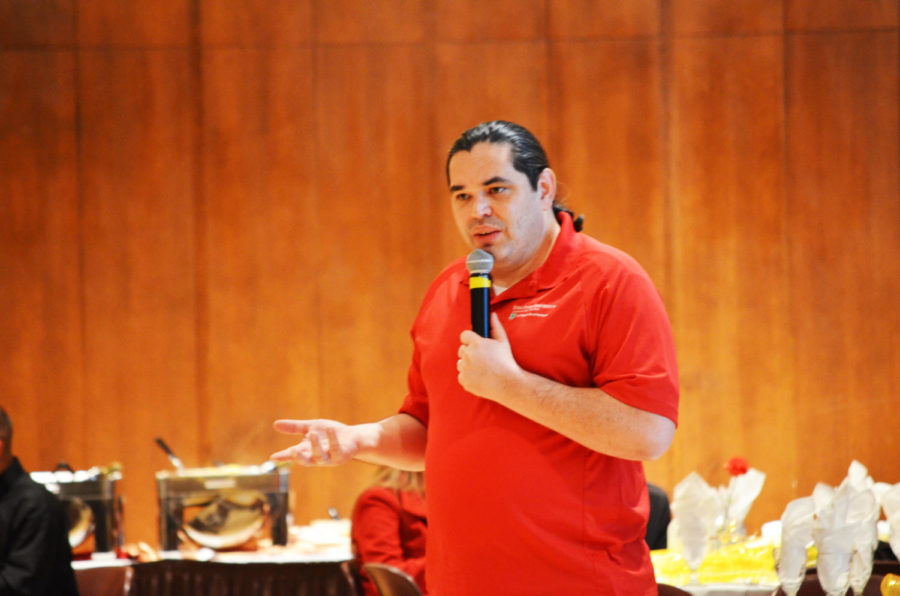4-H leader dismissed following pro-LGBT policy
December 6, 2018
The Trump administration and 4-H leaders pushed to remove a controversial policy protecting LGBT members of the 4-H organization last spring, leading to the ousting of former Iowa 4-H Director John-Paul Chaisson-Cárdenas.
The policy, put in place to make sure LGBT members of the organization felt protected, was published on several states’, including Iowa’s, websites before being quickly removed due to pushback.
“I was terminated because I was a person of color who was a vocal advocate for civil rights compliance within the 4-H program,” said John-Paul Chaisson-Cardenas, former leader of Iowa 4-H.
When asked to respond to Chaisson-Cardenas’s quote, John Lawrence, vice president for extension and outreach, said that he cannot discuss personnel issues.
Chaisson-Cardenas said he spoke at the 2018 campus climate survey forum on May 9 on the subject of making more inclusive policies and was written up and asked to resign by Lawrence the following morning.
Chaisson-Cárdenas said he was given the opportunity to resign at a May 10 disciplinary meeting concerning the pushback or “next steps would be taken.” He decided to keep working.
Chaisson-Cárdenas was terminated in August.
In response to a records request, a text message sent to Chaisson-Cárdenas stated that he was “terminated due to his inability to foster a positive and collaborative work environment, concerns raised by peers and a pattern of poor decision-making and judgment.”
“Quite frankly I think they just got scared and threw me under the bus,” Chaisson-Cardenas said.
The policy itself was a seven page document split into three parts.
The first part of the document was a list of U.S. Department of Agriculture and Iowa State policies that the 4-H policy itself was based on, and the second part of the document was a list of definitions of terms such as sexual orientation, gender identity and gender expression.
“We took the federal and university policies and applied them toward protecting transgender youth,” Chaisson-Cardenas said.
The third part of the document was suggested guidance for members and volunteers of 4-H. These guidance areas included creating a safe and non-discriminatory environment, how to deal with pronouns and making sure transgender individuals are included with the gender they identify within the sex-segregated activities.
Chaisson-Cardenas said LGBT youth in 4-H currently have to use the disability framework set up in the organization to make requests that “should be normal” thus labeling the LGBT youth “broken or disabled for being LGBT.”
The policy was intended to change this among other things within the organization.
Lawrence said the policy was originally written by 4-H leaders in western U.S. states as a guidance document and then posted on the USDA 4-H website. Other states, Iowa included, followed suit.
Lawrence stated that he had nothing to do with the decision to publish the policy on the Iowa website due to being on medical leave for most of March due to a surgery. Lawrence stated that the decision to move forward with the policy was completely on Chaisson-Cardenas.
Iowa’s version of the policy was published as a comment version, where the public could comment anonymously about what they thought about the policy, until April 13 when it was taken down.
Both Chaisson-Cardenas and Lawrence claim to have received personal calls and emails pertaining to the policy, many of them negative.
“In my opinion, I think [the policy was controversial] because it got into details about pronouns and bathrooms and just because someone doesn’t like it they can’t do anything about it,” Lawrence said. “When you put that sort of thing in print and say this is the policy, it drew more attention to it.”
Some of the emails sent to Chaisson-Cardenas claimed the policy was threatening “Christian values” while others threatened him with bodily harm according to Chaisson-Cardenas.
The Des Moines Register reported on Nov. 18 that opponents to the policy cited the First Amendment as a reason for not wanting to follow the policy as it forced them to use words, such as pronouns, when they don’t want to.
“[The policy] wasn’t controversial at first, until a national group took up the cause and went to both the federal government and [4-H] and tried to push back by starting a letter-writing campaign,” Chaisson-Cardenas said.
The group mentioned by Chaisson-Cardenas was identified as The Family Leader which is a conservative Christian group based in Des Moines headed by Bob Vander Plaats. The group issued a call to supporters to protest the document’s “radical” approach on April 12, according to the Des Moines Register.
The policy on the Iowa 4-H website was taken down, after the comment period, on April 13 at 5 p.m. due to the pushing of The Family Leader and threats from “concerned citizen letters”.
Among these letters were 4-H group leaders threatening to leave the organization, one of them in Virginia resigned from her position and removed her children from the program citing her religious beliefs as a reason for leaving.
After the policy was removed, a March 27 email titled “Urgent message” was sent by Dianne Bell, National Institute of Food and Agriculture’s web communications manager.
“Regrettably, we must ask you to remove it from your website immediately,” Bell said in the email. The email did not contain any reasons for the federal retraction of the policy.
As of May 10 new guidelines have been posted on the Iowa 4-H website affirming the 14 characteristics that 4-H does not discriminate on, including sexual orientation and gender identity. However, the new guidelines did not address the use of sex-segregated facilities and activities that the previous policy had which had caused it to become controversial.
According to Lawrence, all 4-H groups across the United States were advised to use their university’s policy in August.







